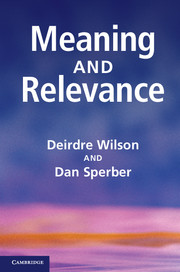Book contents
- Frontmatter
- Contents
- Figures
- Tables
- Preface
- Acknowledgements
- 1 Introduction
- Part I Relevance and Meaning
- Part II Explicit and Implicit Communication
- Part III Cross-Disciplinary Themes
- 12 Pragmatics, modularity and mindreading
- 13 Testing the cognitive and communicative principles of relevance
- 14 The why and how of experimental pragmatics
- 15 A pragmatic perspective on the evolution of language
- Notes
- References
- Index
13 - Testing the cognitive and communicative principles of relevance
Published online by Cambridge University Press: 05 June 2012
- Frontmatter
- Contents
- Figures
- Tables
- Preface
- Acknowledgements
- 1 Introduction
- Part I Relevance and Meaning
- Part II Explicit and Implicit Communication
- Part III Cross-Disciplinary Themes
- 12 Pragmatics, modularity and mindreading
- 13 Testing the cognitive and communicative principles of relevance
- 14 The why and how of experimental pragmatics
- 15 A pragmatic perspective on the evolution of language
- Notes
- References
- Index
Summary
Introduction
A general theory is testable not directly but through consequences it implies when taken together with auxiliary hypotheses. The test can be weaker or stronger depending in particular on the extent to which the consequences tested are specifically entailed by the theory (as opposed to following mostly from the auxiliary hypotheses and being equally compatible with other general theories). The earliest experimental work based on relevance theory (Jorgensen, Miller and Sperber 1984; Happé 1993) tested and confirmed Sperber and Wilson’s (1981) echoic account of irony (and much experimental work on irony since then has broadly confirmed and refined it further). While this account of irony is part and parcel of relevance theory, it is nevertheless compatible with different pragmatic approaches. The experimental confirmation of this account therefore provides only weak support for relevance theory as a whole. More recent experimental work has explicitly formulated, tested and confirmed other, more specific and central consequences of relevance theory. Here we review experiments that test consequences of the most central tenets of the theory: the cognitive and communicative principles of relevance.
The basic tenets of relevance theory
Relevance, as characterised in relevance theory, is a property of inputs to cognitive processes. These inputs include external stimuli (e.g. utterances) and internal representations (e.g. memories or conclusions of inferences, which may then be used as premises for further inferences). When is an input relevant? An input is relevant to an individual when processing it in a context of previously available assumptions yields positive cognitive effects: that is, improvements to the individual???s knowledge that could not be achieved by processing either the context on its own or the new input on its own. These improvements may consist in the derivation of contextual implications, the confirmation of uncertain assumptions, the correction of errors, and also, arguably, the reorganisation of knowledge so as to make it more appropriate for future use.
- Type
- Chapter
- Information
- Meaning and Relevance , pp. 279 - 306Publisher: Cambridge University PressPrint publication year: 2012
- 1
- Cited by



